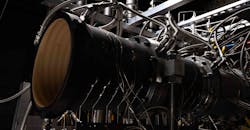GE Aerospace Expanding Hypersonic Testing
GE Aerospace reported it is making “significant investments” in its test infrastructure at three locations to speed results for its hypersonic propulsion systems – the engine technologies needed to power aircraft and weapons systems that travel at speeds of Mach 5 (3,836 mph) or greater.
GE has not indicated the cost of the new investments. “This investment significantly accelerates GE Aerospace’s ability to meet future hypersonic propulsion needs,” stated Mark Rettig, vice president and general manager of Edison Works Advanced Programs at GE Aerospace.
Hypersonic propulsion is a focus of development for defense and aerospace technology developers, as well as the U.S. Dept. of Defense. Recently, GE Aerospace expanded the scope of a partnership to develop hypersonic propulsion systems for drones and aircraft.
Earlier this year, GE Aerospace reported it successfully advanced a hypersonic dual-mode ramjet from design concept to testing in less than a year, followed by testing of a liquid-fueled ramjet 10 months after concept definition.
“By enhancing our infrastructure, we’re not only enabling more representative and scalable testing but also demonstrating our ability to deliver advanced technologies faster and more efficiently, ensuring our customers have the cutting-edge solutions they need when they need them,” Rettig added.
The projects include an updated test cell in Evendale, Ohio, to accommodate larger hypersonic propulsion systems than had been possible there, and to allow testing at higher Mach numbers and simulate more flight conditions.
Separate projects will be implemented at Bohemia, N.Y., to update the test cell facilities there, which is a location acquired in 2022 via GE’s takeover of Innoveering, a hypersonic propulsion technologies business; and at the GE research center in Niskayuna, N.Y., to support evaluation of larger propulsion systems, and to evaluate and refine “next-generation hypersonic propulsion technologies.”
Earlier this year GE Aerospace outlined its capital investment plans for manufacturing operations in 2025, a project list totaling almost $1 billion.
